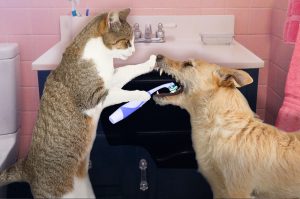 Does your dog no longer have puppy breath? Do you cringe when he licks your face? Bad breath can be an indication of a variety of problems and should serve as a warning that something more serious is going on. In honor of National Pet Dental Health Month, let's take a look inside your pet's mouth.
Does your dog no longer have puppy breath? Do you cringe when he licks your face? Bad breath can be an indication of a variety of problems and should serve as a warning that something more serious is going on. In honor of National Pet Dental Health Month, let's take a look inside your pet's mouth.
Both cats and dogs are at risk for periodontal disease. In fact, it is the most common condition seen in adult dogs and cats. By three years of age, most dogs and cats have some evidence of it. The good news is that it’s preventable. The bad news is that there are few symptoms of the disease in its early stages so preventive care is key.
Most people are surprised to learn that pets get periodontal disease. The difference between animals and people is that we brush and floss and go for regular cleanings. Most pets don’t receive the same care.
The mouth is naturally full of bacteria. Over time, bacteria forms plaque. Minerals in the saliva harden the plaque, forming tartar, also known as caculus. While most pet owners can see the tartar (yellow-brown buildup on the teeth), it’s what lies under the gum line that causes the most damage. That’s why getting regular dental cleanings is important in helping to protect your pet from periodontal disease. To see images of periodontal disease, visit the American College of Veterinary Dentistry.
Signs of periodontal disease include:
If your pet shows any of these signs, make an appointment with your veterinarian. Your pet could be experiencing pain.
Advanced stages of periodontal disease can lead to:
Many pet owners get nervous when they think of their pets getting a teeth cleaning. The biggest worry is over anesthesia. While there is some risk to all surgery, anesthesia is now safer than ever and our board certified anesthesiologists are available to monitor patients throughout the procedure.
Did you know that performing a dental cleaning without anesthesia can actually do more harm?
Injury: Unfortunately, animals do not know how to sit still and keep their mouths open for extended periods of time. This can lead to injury of your pet and of the veterinary staff.
Inefficient: The crowns of the teeth may look great but using that as a guide can give a false sense of health. Periodontal disease actually begins below the gum line and that area cannot be accessed safely and effectively without putting your pet under general anesthesia.
When your pet is ready for home care, your veterinarian will recommend options that are best for you and your pet:
Having a home care plan also ensures that your pet’s mouth is being observed regularly, allowing you to notice any changes early on.
We recommend that you discuss appropriate treats and toys with your pet’s veterinarian. A general rule of thumb for any toy, including chew toys and bones, is to only select ones that can flex and bend. This reduces the risk of your pet fracturing a tooth while chewing on it. There are also approved dental diets that can help decrease plaque, and in the end, help prevent the need for future dental work. To learn how to choose toys that are safe for your pet, watch our client lecture on Toys vs. Teeth.
Cavities do not occur in dogs that are fed proper diets. Cavities are more likely to be caused by treats that are high in carbohydrates (sugars).
Providing home care for your pet not only helps create a great bonding experience, it’s good for your pet’s health, and also restores your pet's sweeter breath!
If you have any questions about your pet’s dental health, contact your veterinarian or visit the Dentistry & Oral Surgery Department to learn more about what dental options exist for pets. You may also call us at (732) 747-3636.